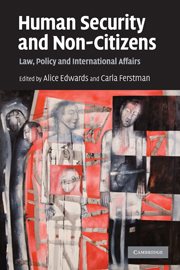Book contents
- Frontmatter
- Contents
- About the editors
- About the contributors
- Preface
- Acknowledgements
- Part I Human security, human rights and human dignity
- Part II Physical and legal security, armed conflict and refuge
- 2 The value of the human security framework in addressing statelessness
- 3 Protection and empowerment: strategies to strengthen refugees' human security
- 4 From here to where? Refugees living in protracted situations in Africa
- 5 Once we were warriors: critical reflections on refugee and IDP militarisation and human security
- 6 Human security and protection from refoulement in the maritime context
- Part III Migration, development and environment
- Part IV National security and the ‘war on terror’
- Index
4 - From here to where? Refugees living in protracted situations in Africa
Published online by Cambridge University Press: 17 February 2011
- Frontmatter
- Contents
- About the editors
- About the contributors
- Preface
- Acknowledgements
- Part I Human security, human rights and human dignity
- Part II Physical and legal security, armed conflict and refuge
- 2 The value of the human security framework in addressing statelessness
- 3 Protection and empowerment: strategies to strengthen refugees' human security
- 4 From here to where? Refugees living in protracted situations in Africa
- 5 Once we were warriors: critical reflections on refugee and IDP militarisation and human security
- 6 Human security and protection from refoulement in the maritime context
- Part III Migration, development and environment
- Part IV National security and the ‘war on terror’
- Index
Summary
Introduction
Protracted refugee situations threaten the human security of refugees as well as the security of host states, the country of origin and the international community. These refugee situations also challenge the overall purpose of international asylum: to protect those who have been forced to flee their home states owing to persecution and/or armed conflict. This is because the long-term nature of asylum without durable solutions in sight leads to the breakdown in social structures and cultural cohesion, which in turn can lead to family breakdown, violence, socio-economic deprivation and poverty, and health problems. As the report of the UN Commission on Human Security notes: ‘[t]here are limits to people's resilience. The enormous and long-term impacts of HIV/AIDS and other infectious diseases, extended deprivation, unemployment, conflict and violence [and displacement] wipe out … coping mechanisms.’
The United States' Committee on Refugees and Immigrants estimates that approximately 9 million refugees are housed in refugee camps for five years or longer. These numbers are unacceptably high. The issue of protracted refugee situations is thus one of the most pressing issues on the international protection agenda. It is an issue of both ‘national’ and ‘regional’ as well as ‘human’ security. Statistics show that over half (55 per cent) of protracted refugee situations are in Africa. Of the global number of refugees in protracted situations, as at 1 January 2008, 22 per cent (almost 2 million) were in Africa.
- Type
- Chapter
- Information
- Human Security and Non-CitizensLaw, Policy and International Affairs, pp. 125 - 165Publisher: Cambridge University PressPrint publication year: 2010
- 1
- Cited by



